L27-动作辅助词 初中英语词性句法新讲课件
文档属性
| 名称 | L27-动作辅助词 初中英语词性句法新讲课件 |
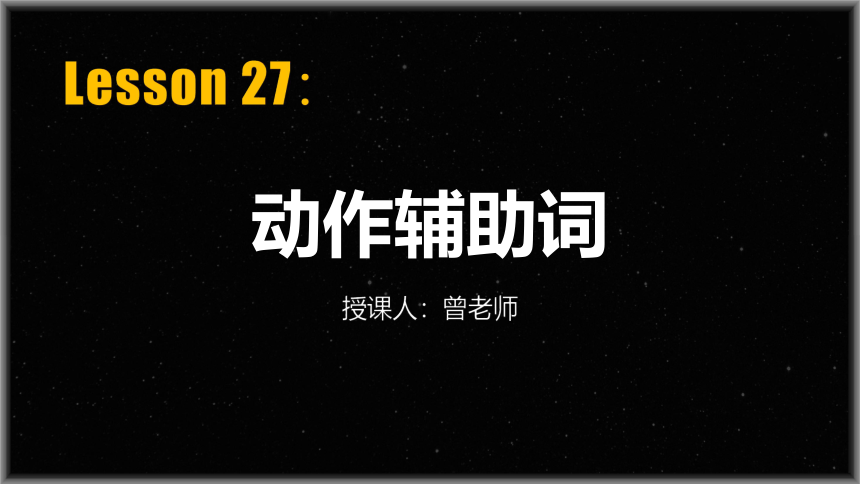
|
|
| 格式 | ppt | ||
| 文件大小 | 963.0KB | ||
| 资源类型 | 试卷 | ||
| 版本资源 | 通用版 | ||
| 科目 | 英语 | ||
| 更新时间 | 2022-04-11 09:59:44 | ||
图片预览


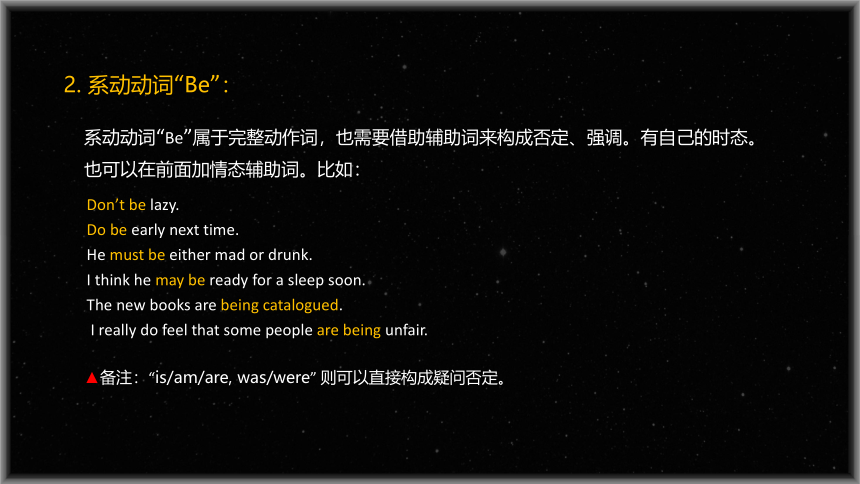
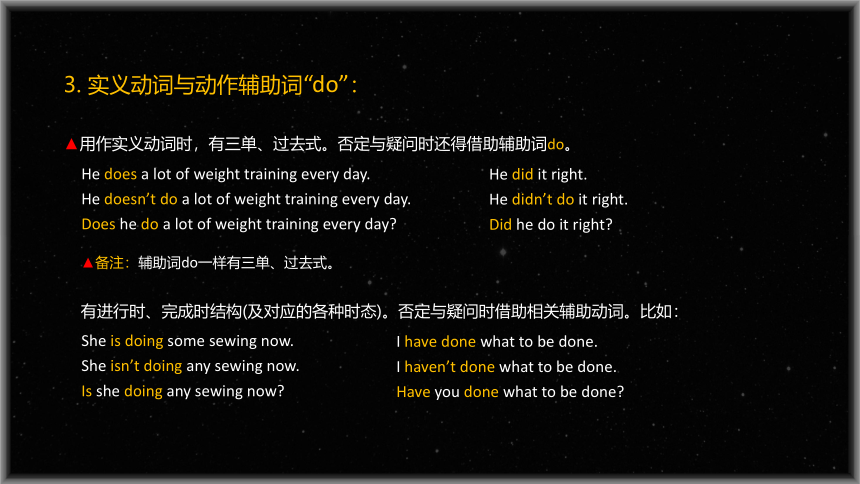
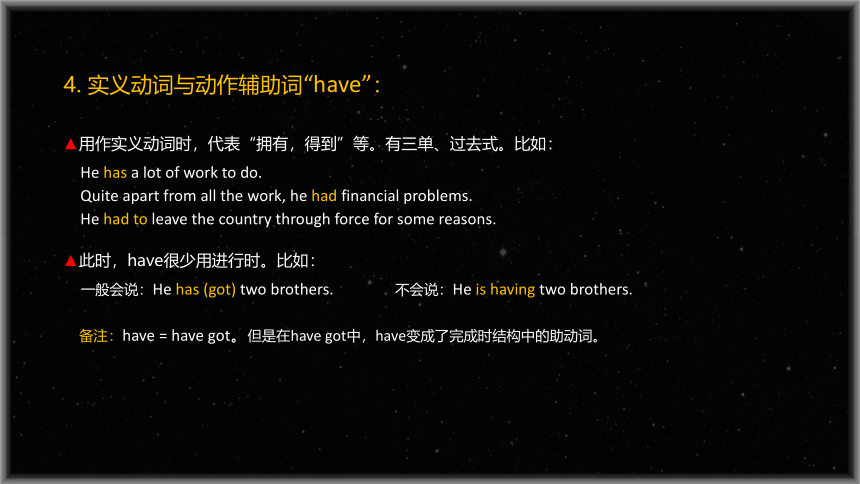
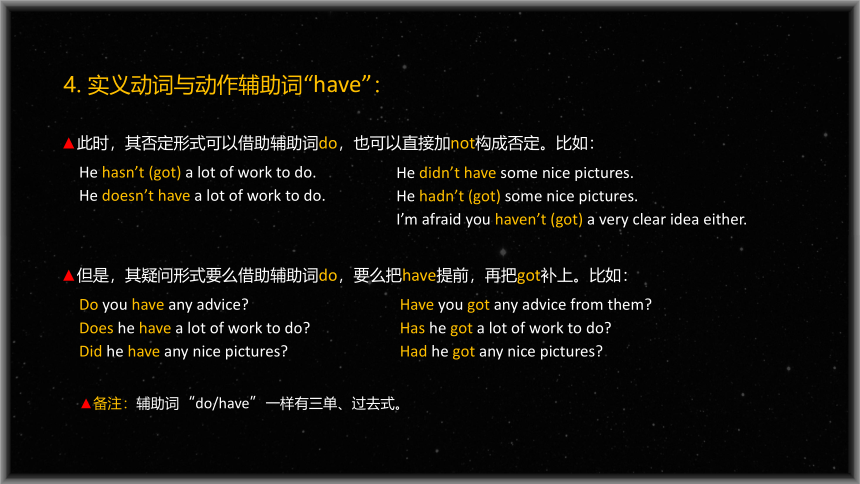
文档简介
(共12张PPT)
动作辅助词
Lesson 27:
授课人:曾老师
1. 完整动作词的辅助词:
1). do : 否定/疑问/强调辅助词
2). have : 时态辅助词 (兼否定/疑问)
3). 情态辅助词 (兼否定/疑问)
can, could, may, might, must, will, would, shall, should, need, dare, have to, ought to
2. 系动动词“Be”:
Don’t be lazy.
Do be early next time.
He must be either mad or drunk.
I think he may be ready for a sleep soon.
The new books are being catalogued.
I really do feel that some people are being unfair.
系动动词“Be”属于完整动作词,也需要借助辅助词来构成否定、强调。有自己的时态。
也可以在前面加情态辅助词。比如:
▲备注:“is/am/are, was/were” 则可以直接构成疑问否定。
3. 实义动词与动作辅助词“do”:
He does a lot of weight training every day.
He doesn’t do a lot of weight training every day.
Does he do a lot of weight training every day
▲用作实义动词时,有三单、过去式。否定与疑问时还得借助辅助词do。
▲备注:辅助词do一样有三单、过去式。
有进行时、完成时结构(及对应的各种时态)。否定与疑问时借助相关辅助动词。比如:
She is doing some sewing now.
She isn’t doing any sewing now.
Is she doing any sewing now
He did it right.
He didn’t do it right.
Did he do it right
I have done what to be done.
I haven’t done what to be done.
Have you done what to be done
4. 实义动词与动作辅助词“have”:
He has a lot of work to do.
Quite apart from all the work, he had financial problems.
He had to leave the country through force for some reasons.
▲用作实义动词时,代表“拥有,得到”等。有三单、过去式。比如:
一般会说:He has (got) two brothers. 不会说:He is having two brothers.
▲此时,have很少用进行时。比如:
备注:have = have got。但是在have got中,have变成了完成时结构中的助动词。
4. 实义动词与动作辅助词“have”:
He hasn’t (got) a lot of work to do.
He doesn’t have a lot of work to do.
▲此时,其否定形式可以借助辅助词do,也可以直接加not构成否定。比如:
He didn’t have some nice pictures.
He hadn’t (got) some nice pictures.
I’m afraid you haven’t (got) a very clear idea either.
Do you have any advice
Does he have a lot of work to do
Did he have any nice pictures
▲但是,其疑问形式要么借助辅助词do,要么把have提前,再把got补上。比如:
Have you got any advice from them
Has he got a lot of work to do
Had he got any nice pictures
▲备注:辅助词“do/have”一样有三单、过去式。
4. 实义动词与动作辅助词“have”:
He has a plate of beef for lunch.
I had a cigarette while I was waiting.
▲注意:作为实义动词时,have还有“吃/喝/吸”或“正在遭遇、正在接受”或“使...怎么样”等
其它意思。同样,它有三单、过去式。比如:
▲此时,其否定形式与疑问形式一般借助辅助词do(does/did)。比如:
He doesn’t have a plate of beef for lunch.
I didn’t have my glasses on.
4. 实义动词与动作辅助词“have”:
He is having some big troubles.
I am having treatment for my back problem.
We are having our car repaired.
Everybody there was having a terrific time.
▲也可以用进行时。比如:
4. 实义动词与动作辅助词“have”:
She has got a BA in English.
Alex has already gone...
We haven’t got a television.
You haven’t sent her away, have you ...
He had seldom seen a child with so much talent.
▲have作为辅助词,构成完成时。此时可以直接加not构成否定,也可以提前构成疑问。比如:
▲备注:辅助词“have”一样有三单形式,或用过去式构成过去完成时。
5. 其它几个特殊辅助词:
wanna:意思上相当于“want to”
I wanna be married to you. Do you wanna be married to me
I don’t wanna have this conversation with you again.
used to:过去常常…(怎么样)
I used to do business with him.
Your brother didn’t use to go to the zoo.
happen to:碰巧…(怎么样)
If you happen to talk to him, have him call me.
I happened to be at the station when he arrived.
5. 其它几个特殊辅助词:
had better:最好…(怎么样)
We’d better hurry or we’ll miss the train.
You’d better not talk with any strangers.
would rather:宁愿…(怎么样)
Kids would rather play than study.
I would rather not have said that.
help:帮助…(怎么样)
... help clean the room.
6. 特别提醒:
如果不是辅助词,后接动作时,则需使用不定式或动名词或分词。比如:
后接不定式,表示接下来要去做的一件事:
Next year we hope to have a bigger share of the market.
He promised to make all his efforts to help us.
后接动名词,表示该动作行为的名称(日常行为):
You should practice speaking English more.
My son enjoys reading very much.
后接现在分词,表示目的或伴随性的动作行为:
He went swimming the other day.
He stayed at home, cleaning and washing.
动作辅助词
Lesson 27:
授课人:曾老师
1. 完整动作词的辅助词:
1). do : 否定/疑问/强调辅助词
2). have : 时态辅助词 (兼否定/疑问)
3). 情态辅助词 (兼否定/疑问)
can, could, may, might, must, will, would, shall, should, need, dare, have to, ought to
2. 系动动词“Be”:
Don’t be lazy.
Do be early next time.
He must be either mad or drunk.
I think he may be ready for a sleep soon.
The new books are being catalogued.
I really do feel that some people are being unfair.
系动动词“Be”属于完整动作词,也需要借助辅助词来构成否定、强调。有自己的时态。
也可以在前面加情态辅助词。比如:
▲备注:“is/am/are, was/were” 则可以直接构成疑问否定。
3. 实义动词与动作辅助词“do”:
He does a lot of weight training every day.
He doesn’t do a lot of weight training every day.
Does he do a lot of weight training every day
▲用作实义动词时,有三单、过去式。否定与疑问时还得借助辅助词do。
▲备注:辅助词do一样有三单、过去式。
有进行时、完成时结构(及对应的各种时态)。否定与疑问时借助相关辅助动词。比如:
She is doing some sewing now.
She isn’t doing any sewing now.
Is she doing any sewing now
He did it right.
He didn’t do it right.
Did he do it right
I have done what to be done.
I haven’t done what to be done.
Have you done what to be done
4. 实义动词与动作辅助词“have”:
He has a lot of work to do.
Quite apart from all the work, he had financial problems.
He had to leave the country through force for some reasons.
▲用作实义动词时,代表“拥有,得到”等。有三单、过去式。比如:
一般会说:He has (got) two brothers. 不会说:He is having two brothers.
▲此时,have很少用进行时。比如:
备注:have = have got。但是在have got中,have变成了完成时结构中的助动词。
4. 实义动词与动作辅助词“have”:
He hasn’t (got) a lot of work to do.
He doesn’t have a lot of work to do.
▲此时,其否定形式可以借助辅助词do,也可以直接加not构成否定。比如:
He didn’t have some nice pictures.
He hadn’t (got) some nice pictures.
I’m afraid you haven’t (got) a very clear idea either.
Do you have any advice
Does he have a lot of work to do
Did he have any nice pictures
▲但是,其疑问形式要么借助辅助词do,要么把have提前,再把got补上。比如:
Have you got any advice from them
Has he got a lot of work to do
Had he got any nice pictures
▲备注:辅助词“do/have”一样有三单、过去式。
4. 实义动词与动作辅助词“have”:
He has a plate of beef for lunch.
I had a cigarette while I was waiting.
▲注意:作为实义动词时,have还有“吃/喝/吸”或“正在遭遇、正在接受”或“使...怎么样”等
其它意思。同样,它有三单、过去式。比如:
▲此时,其否定形式与疑问形式一般借助辅助词do(does/did)。比如:
He doesn’t have a plate of beef for lunch.
I didn’t have my glasses on.
4. 实义动词与动作辅助词“have”:
He is having some big troubles.
I am having treatment for my back problem.
We are having our car repaired.
Everybody there was having a terrific time.
▲也可以用进行时。比如:
4. 实义动词与动作辅助词“have”:
She has got a BA in English.
Alex has already gone...
We haven’t got a television.
You haven’t sent her away, have you ...
He had seldom seen a child with so much talent.
▲have作为辅助词,构成完成时。此时可以直接加not构成否定,也可以提前构成疑问。比如:
▲备注:辅助词“have”一样有三单形式,或用过去式构成过去完成时。
5. 其它几个特殊辅助词:
wanna:意思上相当于“want to”
I wanna be married to you. Do you wanna be married to me
I don’t wanna have this conversation with you again.
used to:过去常常…(怎么样)
I used to do business with him.
Your brother didn’t use to go to the zoo.
happen to:碰巧…(怎么样)
If you happen to talk to him, have him call me.
I happened to be at the station when he arrived.
5. 其它几个特殊辅助词:
had better:最好…(怎么样)
We’d better hurry or we’ll miss the train.
You’d better not talk with any strangers.
would rather:宁愿…(怎么样)
Kids would rather play than study.
I would rather not have said that.
help:帮助…(怎么样)
... help clean the room.
6. 特别提醒:
如果不是辅助词,后接动作时,则需使用不定式或动名词或分词。比如:
后接不定式,表示接下来要去做的一件事:
Next year we hope to have a bigger share of the market.
He promised to make all his efforts to help us.
后接动名词,表示该动作行为的名称(日常行为):
You should practice speaking English more.
My son enjoys reading very much.
后接现在分词,表示目的或伴随性的动作行为:
He went swimming the other day.
He stayed at home, cleaning and washing.
同课章节目录
- 词法
- 名词
- 动词和动词短语
- 动词语态
- 动词时态
- 助动词和情态动词
- 非谓语动词
- 冠词
- 代词
- 数词和量词
- 形容词副词及其比较等级
- 介词和介词短语
- 连词和感叹词
- 构词法
- 相似、相近词比较
- 句法
- 陈述句
- 一般疑问句和否定疑问句
- 特殊疑问句及选择疑问句
- 反意疑问句
- 存在句(There be句型)
- 宾语从句
- 定语从句
- 状语从句
- 主谓一致问题
- 简单句
- 并列句
- 复合句
- 主谓一致
- 主、表语从句
- 名词性从句
- 直接引语和间接引语
- 虚拟语气
- 感叹句
- 强调句
- 倒装句
- 祈使句
- 句子的成分
- 句子的分类
- 题型专区
- 单项选择部分
- 易错题
- 完形填空
- 阅读理解
- 词汇练习
- 听说训练
- 句型转换
- 补全对话
- 短文改错
- 翻译
- 书面表达
- 任务型阅读
- 语法填空
- 其他资料
